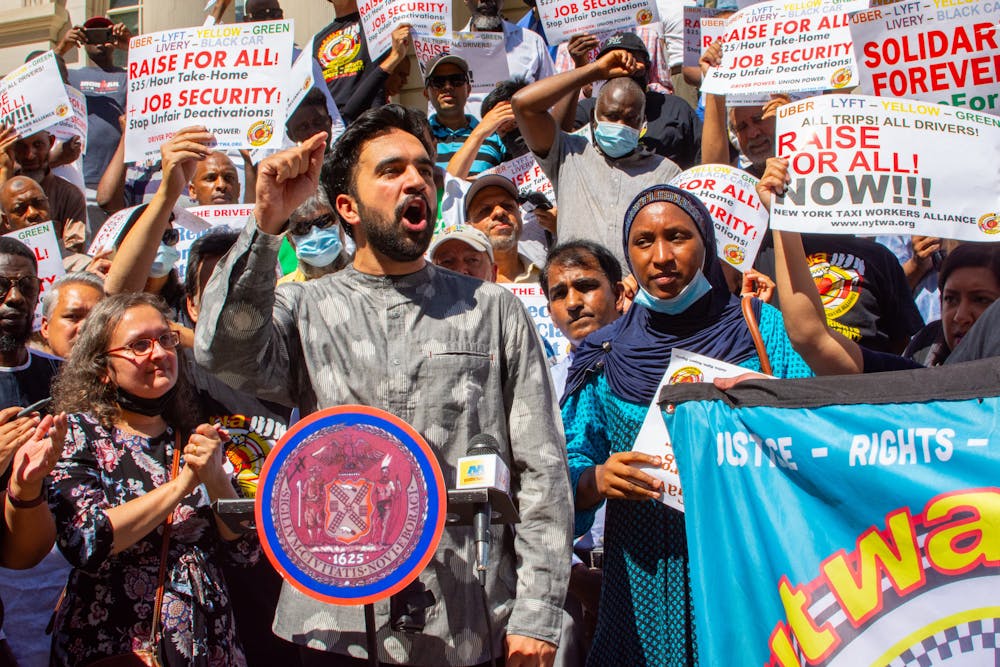A breath of fresh air. It feels like a breath of fresh air.
I have long avoided publicizing my political opinions and endorsements. I decline answering political questions, maintaining a front of pledged ignorance toward hard-hitting issues to avoid societal judgement or breaking peaceful discourse. Lately, however, my silence toward U.S. politics stems from a growing disillusionment with a system that I know, deep down, does not change from my outcry or frustration. As a left-leaning, Muslim and South Asian immigrant, I have stopped tracking the influx of old white men (often with sexual assault allegations) claiming they represent me and the average, working-class American, while instead representing the interests of the wealthy elite. Ever since the Democratic party morphed into a faded defensive line against Donald Trump’s absurd unconstitutional practices, I have consistently fled from political spheres in defeat. I walk on the streets of New York City, paying hundreds of dollars for groceries in a two-person household, witnessing the dignity draining from neighbors on the street who can’t afford their homes and fearing for racially and ideologically-targeted violence, in complete defeat.
So when I heard about Zohran Kwame Mamdani’s bid to win the NYC mayoral primary, I laughed. I looked into his virtual eyes, heard his bold stance as a Democratic-Socialist and simply laughed at the thought of a Muslim immigrant running the country’s biggest financial and cultural powerhouse — in the second Trump era, at that. In fear of growing attached to his charismatic appeal and bold pleas to make the city that I call home more affordable and inclusive of its multiethnic residents, I shook away any possibility of Mamdani winning the primary. Months later, here he is: the NYC mayor-elect, and here I am: a New Yorker who finally sees her vision for the city far from the margins of American politics and at the forefront of Mamdani’s new, people-centered administration.
Born in Uganda and raised in NYC, Mamdani has represented the city’s diverse heartbeat every step through his campaign. Nearly 37% of New Yorkers were born outside of the U.S., 49% speak a language other than English at home and nearly half of the city's businesses are owned by immigrants. NYC alone consists of hundreds of neighborhoods, consistently evolving in demographic composition and cultural practices. Whether through translating campaign literature and videos in Urdu, Arabic, Bangla, Spanish and more or visiting taxi drivers at LaGuardia Airport and immigrant owners in bodegas, Mamdani made it his mission to convince the city's cultural diaspora that he runs as a vessel for them. Departing from the norm of a distanced, elite politician to a man of the people, Mamdani signals a prominent shift in American politics. Even the branding of Mamdani’s campaign — “Zohran for New York City” — exemplifies his drive to connect with New Yorkers as a human being on a first-name basis, someone who works for them.
By April of 2025, the average monthly rent across NYC approached $3,966, about 144% more than the U.S. national average of $1,625. According to Mamdani’s platform, 25% of all NYC homeowners spend more than half their income on housing: far above the 30% “affordability” benchmark. Atrociously, millions of New Yorkers live day to day, barely making ends meet in a city they’ve lived in their entire lives. NYC has grown to be an incredibly unlivable city, and politicians have shamefully avoided tackling the affordability crisis head-on — until now. Mamdani’s platform has boldly tackled housing affordability, proposing to build 200,000 new rent-stabilized homes in the next decade, city-owned grocery stores, fare-free buses, free childcare and a rent freeze for the current two million rent-stabilized apartments if he wins. In contrast, current mayor Eric Adams has only raised rents on stabilized apartments by 12.6%.
His campaign even launched an “affordability calculator,” showing that a family using his free bus and child-care proposals could save an estimated $45,960 annually under his plan. For once, his campaign does not chirp around issues, instead blatantly committing to the unglamorous yet proper role of government: one that rightfully exists to “lower costs and make lives better.”
Perhaps most controversially, Mamdani is one of the few politicians to boldly condemn the Israeli government for its actions in Gaza, including intentionally committing genocide and mass famine, according to the United Nations. Mamdani has promised to end the New York City-Israel Economic Council, established by current mayor Adams. More impressively, Mamdani has separated anti-Zionism and antisemitism to allow for accountability measures against Israel, while staunchly campaigning against antisemitism and committing to protect Jewish New Yorkers. Mamdani easily could have dulled his voice down, morphing his true feelings into the dominant attitudes surrounding him, but he refused to budge. He chose to remain steadfast in his lifelong advocacy for the Palestinian cause. In an age where politicians often mold their beliefs and appeals to the whims of current order at the time, Mamdani’s authenticity eases my naturally-inclined distrust of politicians.
Throughout the campaign, former New York governor and independent nominee Andrew Cuomo has capitalized on the ambivalence of Jewish voters, arguing that Mamdani poses a threat to the city’s Jewish community by calling him a “terrorist sympathizer” and proclaiming that “anti-Zionism is antisemitism.” In a radio interview, Cuomo agreed as a conservative host on WABC said Mamdani would cheer another 9/11-style attack. Cuomo’s campaign briefly posted an AI-generated video on social media that depicted Mamdani eating rice with his hands and called him an “inexperienced radical.” Beyond Cuomo, the Republican nominee Curtis Sliwa falsely accused Mamdani of supporting “global jihad” during a televised debate. Adams, after endorsing Cuomo, said the city risked falling into “Islamic extremism” as Europe had if Mamdani was elected.
In this age, political opponents regularly resort to brutal comments when running for a contested position; however, why is it normal to direct race- and religion-based attacks to Mamdani? Why can’t a Muslim man run for a political office without being labeled as sympathetic to terrorists? Why can’t an Indian man run without derogatory portrayals of eating culture? Beyond himself, Mamdani’s bid has been scary for all Muslims in New York, who are well familiar with the rise of Islamophobia resulting from Muslims being brought to the forefront of American politics. Muslims know they will face the brute force of any hatred toward Mamdani. But despite these attacks and despite this attempted defaming, Mamdani persisted in his identity and his message, even visiting over 50 mosques throughout his campaign.
I grew up in NYC years after the 9/11 attacks; in its brutal shadow, I’ve seen it all: from a bus driver kicking me and my mom off early on my way to elementary school for “security reasons,” to receiving anonymous text messages telling me “my people should pay for the twin towers.” Witnessing a man shamelessly embrace his religion and heritage, while publicly and tearfully sharing the Muslim experience in NYC, mended a part of me that I didn’t realize was broken. For the first time, a political leader has emphasized that Muslims should not have to hide their faith in their own city but rather, they should carry it proudly. Mamdani’s courage has made Muslims like me finally open up about the aches that have built up from years of silent societal assault and see a glimpse of a healing light ahead.
Mamdani’s win is nothing short of a perfectly audacious revolutionary paradigm shift. He has rewritten the script on what it means to be a politician and, at that, a South Asian Muslim politician. Without letting fear stop him, Mamdani ran to become a political disruptor. He convinced the city run by Wall Street businessmen and corrupt politicians that it’s ready to have a loud, idealistic, unapologetically Democratic-Socialist man lead its people. This beginning of his legacy has energized a new force in American politics: South Asians and young voters. I know when I return home to Mamdani’s New York, I don’t have to slouch my shoulders in tension with my identity and the surrounding politics.
So, yes, Mamdani’s win feels like a breath of fresh air.
Myra Saeed is a sophomore majoring in Chemistry and History from Queens, N.Y. She is a News and Features Editor for The News-Letter.





